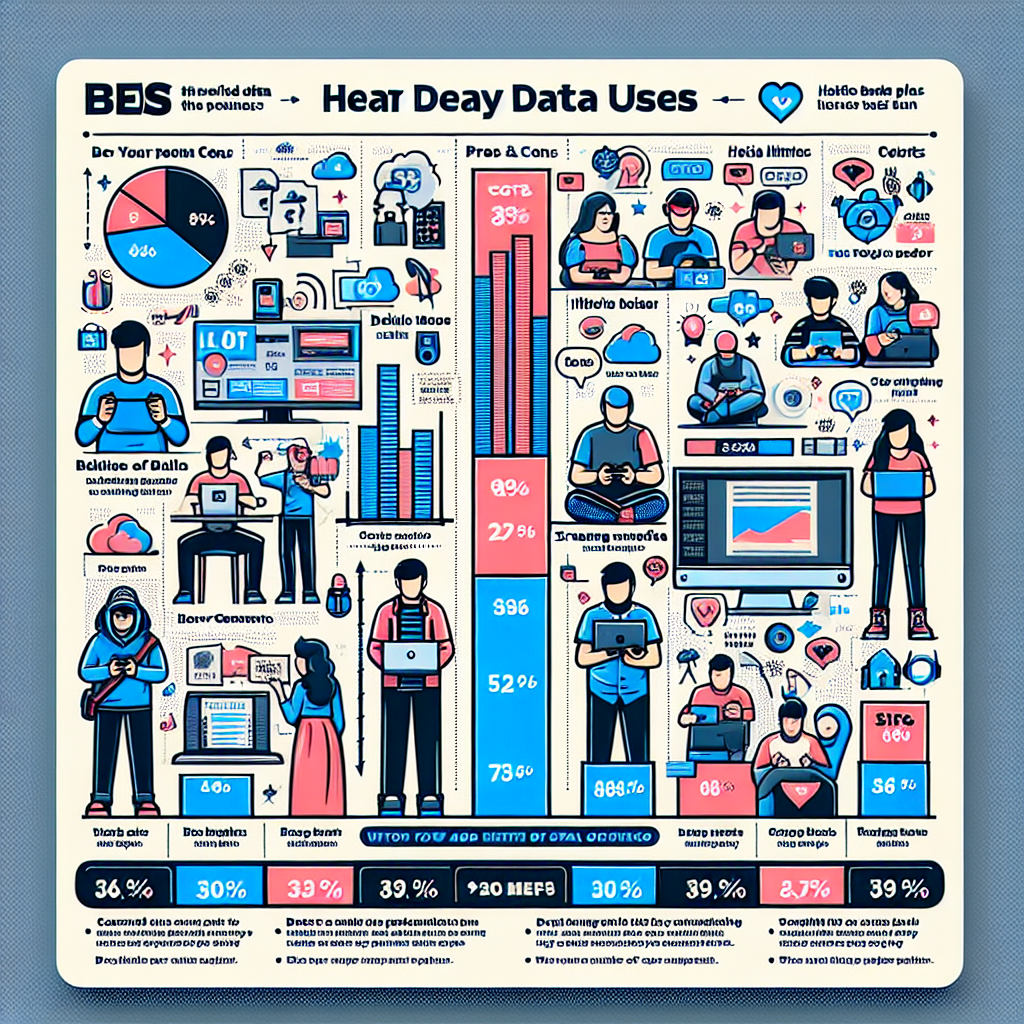In a world where internet usage is at an all-time high, heavy data users are constantly searching for the best data plans to keep up with their online activities. From streaming videos and gaming, to video conferencing and downloading large files, these users demand a data plan that can handle their data-hungry needs. In this article, we will explore some of the top data plans available for heavy data users, analyzing their features, benefits, and affordability. Whether you’re a digital nomad, a content creator, or simply love staying connected 24/7, finding the right data plan is essential for a seamless online experience. Let’s dive in and discover the perfect data plan for you!
Understanding Data Plans for Heavy Data Users

In the realm of modern technology and connectivity, heavy data users refer to individuals who extensively rely on data-consuming activities such as streaming high-definition videos, online gaming, video conferencing, and large file downloads/upload. These users typically have a substantial need for data allocation to support their online habits effectively.
Importance of Suitable Data Plans for Heavy Data Users
The significance of selecting appropriate data plans for heavy data users cannot be overstated. Unlike light data users, heavy data users require larger data allowances to accommodate their frequent and data-intensive online activities. Opting for a data plan that does not align with their usage patterns can lead to overage charges, speed throttling, or even complete suspension of services, hindering their online experience and productivity.
Factors to Consider When Choosing Data Plans
When heavy data users are evaluating data plans, several crucial factors come into play to ensure they select the most suitable option for their needs:
-
Data Allocation: The foremost consideration is the amount of data offered in the plan. Heavy data users should opt for plans with high data caps or unlimited data to prevent running out of data mid-month.
-
Speed and Bandwidth: Another critical factor is the speed and bandwidth offered by the data plan. Heavy data users require fast and reliable connections to support their data-heavy activities seamlessly.
-
Throttling Policies: Understanding the provider’s policies on data throttling is essential. Some plans may reduce speeds after reaching a certain data threshold, impacting the user experience.
-
Additional Features: Heavy data users should also assess any additional features included in the data plan, such as mobile hotspot capabilities, international data roaming, or content streaming perks.
-
Cost and Value: While cost is a significant factor, heavy data users should prioritize the value offered by the data plan in terms of data allocation, speed, and additional features, ensuring they get the best bang for their buck.

Types of Data Plans Available
Prepaid Data Plans
Prepaid data plans are a popular option for heavy data users who prefer flexibility and control over their usage without being tied to a contract. These plans typically require users to pay for data in advance, allowing them to monitor their usage closely and avoid unexpected charges.
Advantages and disadvantages
Advantages:
– Flexibility: Prepaid data plans offer users the flexibility to choose how much data they need each month without long-term commitments.
– No credit check: Since prepaid plans do not require a credit check, they are accessible to a wider range of customers.
– No overage charges: Users won’t incur overage charges with prepaid plans as they can only use the data they have paid for.
Disadvantages:
– Higher cost per gigabyte: Prepaid plans can be more expensive per gigabyte compared to postpaid plans, especially for heavy data users.
– Limited features: Some prepaid plans may have limitations on features such as data speed or international roaming.
– Recharge hassle: Users need to remember to recharge their plan regularly to avoid running out of data unexpectedly.
Recommended prepaid data plans for heavy data users
- Verizon Prepaid Unlimited Plan: This plan offers unlimited data with high-speed hotspot tethering and international messaging options.
- AT&T Prepaid Unlimited Plus: With this plan, heavy data users can enjoy unlimited high-speed data and access to AT&T’s extensive network.
- T-Mobile Simply Prepaid Unlimited: T-Mobile’s prepaid plan includes unlimited data, talk, and text with no annual contracts for heavy data users looking for flexibility and value.
Postpaid Data Plans
Types of Data Plans Available
Postpaid data plans are a popular choice for heavy data users due to their flexibility and typically larger data allowances compared to prepaid options. These plans require users to pay a fixed monthly fee in exchange for a set amount of data, usually with the option to add more data if needed.
Advantages:
- Higher Data Limits: Postpaid plans often offer significantly higher data limits than prepaid plans, making them ideal for heavy data users who consume large amounts of data regularly.
- Roll-over Data: Some postpaid plans allow users to roll over unused data to the next month, ensuring that data does not go to waste.
- Additional Features: Postpaid plans often come with additional features such as unlimited calling and texting, making them a comprehensive option for those who require more than just data.
Disadvantages:
- Contract Commitments: Postpaid plans typically require users to sign a contract for a fixed term, which may not be suitable for those who prefer flexibility or short-term plans.
- Higher Costs: Postpaid plans can be more expensive than prepaid options, especially if users exceed their data limits and incur additional charges.
Recommended postpaid data plans for heavy data users:
- Verizon Unlimited Plans: Verizon offers a range of unlimited postpaid data plans with varying data speeds and additional features such as hotspot data and international roaming.
- AT&T Unlimited Elite: AT&T’s Unlimited Elite plan provides unlimited high-speed data, HD streaming, and 30GB of mobile hotspot data, making it a solid choice for heavy data users.
- T-Mobile Magenta Max: T-Mobile’s Magenta Max plan offers unlimited premium data, 40GB of high-speed mobile hotspot data, and taxes and fees included in the monthly price, making it a convenient option for heavy data users looking for transparency in pricing.
Unlimited Data Plans
Features and limitations
Unlimited data plans are a popular option among heavy data users, offering the freedom to consume data without the fear of exceeding limits. These plans typically include unlimited high-speed data, allowing users to stream videos, download large files, and engage in online activities without worrying about data caps. Additionally, unlimited plans often come with unlimited talk and text, providing a comprehensive communication package for users. However, it’s essential to note that some unlimited data plans may have certain limitations or restrictions.
Some common limitations of unlimited data plans include:
- Data Deprioritization: In times of network congestion, heavy data users may experience slower speeds compared to other users who haven’t reached their data threshold.
- Throttling: Some carriers may throttle data speeds after a certain usage threshold is reached, resulting in slower data speeds for the remainder of the billing cycle.
- Hotspot Data Limits: While the primary data usage may be unlimited, hotspot data for tethering other devices may have a cap, after which speeds are reduced.
- International Usage Restrictions: Unlimited plans may have limitations on international data usage, with additional charges or reduced speeds when using data abroad.
Best unlimited data plans for heavy data users
When considering the best unlimited data plans for heavy data users, several factors come into play. It’s essential to evaluate the coverage, speed, additional features, and overall value offered by each plan. Some of the top unlimited data plans for heavy data users include:
-
Verizon Get More Unlimited: Known for its extensive coverage and reliable network speeds, Verizon’s Get More Unlimited plan offers premium features such as HD video streaming, unlimited mobile hotspot data at 4G LTE speeds, and access to Apple Music.
-
AT&T Unlimited Elite: AT&T’s Unlimited Elite plan provides users with unlimited high-speed data, HD video streaming, 30GB of mobile hotspot data per line, and HBO Max subscription included.
-
T-Mobile Magenta MAX: T-Mobile’s Magenta MAX plan stands out for its generous high-speed data allotment, unlimited premium data, unlimited in-flight Wi-Fi, and Netflix subscription included.
When selecting an unlimited data plan for heavy data usage, it’s crucial to assess your specific data needs, budget, and preferences to find the most suitable option that meets your requirements.
Data Caps and Throttling
Data caps refer to the maximum amount of data that a user can consume within a specific billing cycle. Once this limit is reached, the user may experience throttling, which is the intentional slowing down of internet speed by the service provider. Throttling is often implemented to manage network congestion and ensure fair usage among customers.
Impact on Heavy Data Users
For heavy data users, data caps and throttling can be particularly problematic. These users typically rely on large amounts of data for streaming, gaming, or working remotely. When faced with data caps, heavy data users may find themselves running out of data before the end of the billing cycle, leading to reduced internet speeds that can significantly impact their online activities.
Ways to Manage Data Caps and Throttling
- Monitor Data Usage: Heavy data users can track their data consumption regularly to stay within the limits set by their data plan.
- Upgrade Data Plan: Consider switching to a data plan with higher or unlimited data to avoid the risk of hitting data caps.
- Opt for Throttling Mitigation Services: Some internet service providers offer packages that reduce the impact of throttling for heavy data users.
- Use Wi-Fi Whenever Possible: Connect to Wi-Fi networks to conserve mobile data for essential tasks, especially when engaging in data-intensive activities.
Wi-Fi vs. Mobile Data
Wi-Fi and mobile data are two primary sources of internet connectivity for heavy data users, each with its own set of advantages and limitations. Understanding the distinctions between the two can aid in determining the most suitable data plan for individual needs.
Pros and Cons of Using Wi-Fi for Heavy Data Users
- Pros:
- Cost-Effective: Wi-Fi connections are often more cost-effective than mobile data plans, especially for heavy data users who consume large amounts of data regularly.
- Faster Speeds: Wi-Fi networks generally offer faster connection speeds compared to mobile data, facilitating smoother streaming, downloads, and browsing experiences.
-
Unlimited Data: Many home and public Wi-Fi networks provide unlimited data usage, eliminating concerns about exceeding data caps.
-
Cons:
- Limited Accessibility: Wi-Fi is not available everywhere, restricting connectivity to specific locations such as home, office, or designated public hotspots.
- Security Risks: Public Wi-Fi networks can pose security risks, making it crucial for heavy data users to employ additional security measures such as virtual private networks (VPNs).
- Interference and Network Congestion: Wi-Fi signals can suffer from interference and network congestion, leading to slower speeds and less reliable connections during peak usage times.
Pros and Cons of Using Mobile Data for Heavy Data Users
- Portability: Mobile data enables heavy data users to stay connected on the go, providing internet access wherever there is cellular coverage.
- Convenience: Mobile data eliminates the need to rely on Wi-Fi networks, offering greater flexibility and accessibility for data consumption.
-
Personal Hotspot Feature: Many mobile data plans include a personal hotspot feature, allowing heavy data users to share their mobile connection with other devices.
-
Data Caps and Overages: Mobile data plans often come with data caps, and exceeding these limits can result in additional charges or throttled speeds for heavy data users.
- Slower Speeds: In comparison to Wi-Fi, mobile data speeds may be slower, particularly in areas with poor cellular coverage or high network congestion.
- Cost: Mobile data plans tailored for heavy data usage can be more expensive than standard plans, potentially leading to higher monthly expenses for users with significant data needs.
Family Data Plans
In today’s data-driven world, heavy data users often find themselves in need of comprehensive family data plans that cater to their substantial data consumption requirements. Family data plans offer a range of benefits specifically designed to accommodate the data needs of multiple users within a household efficiently.
- Benefits of family data plans for heavy data users:
- Cost-Effectiveness: Family data plans typically offer cost savings compared to individual plans, making them an attractive option for heavy data users looking to manage expenses while enjoying ample data allowances.
- Shared Data Pool: With family data plans, users can share a common data pool, ensuring that data is utilized efficiently across all devices and users within the family unit.
-
Convenience: Consolidating data plans under a single family account simplifies billing and account management, streamlining the process for heavy data users with multiple lines.
-
Considerations when choosing family data plans:
- Data Allocation: Evaluate the data allocation offered by different family plans to ensure that the overall data allowance meets the collective needs of all users within the family.
- Additional Features: Consider additional features such as mobile hotspot capabilities, international roaming options, and data rollover benefits that can enhance the value of the family data plan.
-
Network Coverage: Assess the network coverage and reliability of the service provider to ensure consistent data connectivity, especially for heavy data users who rely on seamless internet access for various purposes.
-
Top family data plans suitable for heavy data users:
- Provider A Family Plan: Offers generous data allowances, unlimited talk and text, and access to premium streaming services, making it ideal for heavy data users who prioritize entertainment and communication.
- Provider B Family Plan: Emphasizes data flexibility with customizable data options for each family member, ensuring that heavy data users can tailor their data allocations to suit their individual usage patterns.

- Provider C Family Plan: Focuses on international connectivity with competitive roaming rates and international calling features, catering to heavy data users who frequently travel or have international communication needs.
Comparing Data Plans from Different Providers
When it comes to comparing data plans from different providers, heavy data users need to carefully assess various aspects before making a decision. Here are the key factors to consider when evaluating data plans:
-
Data Allowance: The most critical aspect for heavy data users is the data allowance offered by each plan. Look for plans that provide high data caps or even unlimited data to ensure your usage needs are met without incurring extra charges.
-
Speed: Along with data allowance, the speed at which data is delivered is crucial for heavy data users. Opt for plans that offer fast and consistent speeds to support activities like streaming, online gaming, and large file downloads.
-
Coverage: Check the coverage area of each provider to ensure that you will have a reliable connection where you need it most. Some providers may offer great plans but lack coverage in certain regions.
-
Price: While heavy data users may be willing to pay more for extensive data allowances, it’s essential to compare prices across providers to find a plan that offers the best value for the services provided.
-
Additional Features: Some data plans come with extra features like free streaming services, international roaming, or bundled discounts. Consider these additional perks when comparing plans to determine which align best with your usage habits.
By carefully evaluating these factors across different providers, heavy data users can select a data plan that not only meets their data needs but also offers high-quality service and value for money.
FAQs: Exploring the Best Data Plans for Heavy Data Users
What are some factors to consider when choosing a data plan for heavy data users?
When selecting a data plan for heavy data users, it is important to consider the amount of data provided, the speed of the internet connection, any throttling or data caps, coverage and reliability of the network, and the cost of the plan. Heavy data users should also consider if the plan offers any additional perks such as unlimited streaming or hotspot data.
Are unlimited data plans always the best option for heavy data users?
While unlimited data plans may seem like the best option for heavy data users, it is essential to consider any throttling that may occur after a certain amount of data usage. Some unlimited plans may slow down the internet speed once a certain threshold is reached, which can be frustrating for heavy data users. It is crucial to read the fine print and understand the terms and conditions of the plan before committing.
How can heavy data users track their data usage to avoid overage charges?
Many carriers offer tools and apps that allow heavy data users to track their data usage in real time. Users can set up notifications or alerts to be notified when they are approaching their data limit. It is also helpful to monitor data usage regularly and adjust usage habits accordingly to avoid overage charges. Some carriers even offer the option to add more data to the plan if needed.
Are family plans a good option for heavy data users?
Family plans can be an excellent option for heavy data users, as they often offer discounts for multiple lines and shared data. This can be cost-effective for families or groups of heavy data users who want to share a data plan. However, it is important to consider each individual’s data usage habits and needs to ensure that the plan provides enough data for everyone.